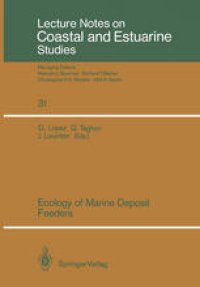
Ebook: Ecology of Marine Deposit Feeders
- Tags: Ecology, Zoology
- Series: Lecture Notes on Coastal and Estuarine Studies 31
- Year: 1989
- Publisher: Springer-Verlag New York
- Edition: 1
- Language: English
- pdf
Deposit feeders, animals that derive nutrition from organic matter in sedimentary deposits, are dominant among the inhabitants of muds and, therefore, of the benthos of much of the ocean. In this volume the critical research problems pertaining to deposit feeders are identified and promising approaches for dealing with those problems are proposed. Interdisciplinary approaches are of utmost importance in the study of deposit feeders and their sedimentary environment, merging fields as disparate as nutritional physiology and sediment geochemistry. Among the topics presented are advances in theories of foraging and digestion, and new experimental approaches to study the potential foods, feeding behavior and physiology of animals that ingest sediment.
Deposit feeders, animals that derive nutrition from organic matter in sedimentary deposits, are dominant among the inhabitants of muds and, therefore, of the benthos of much of the ocean. In this volume the critical research problems pertaining to deposit feeders are identified and promising approaches for dealing with those problems are proposed. Interdisciplinary approaches are of utmost importance in the study of deposit feeders and their sedimentary environment, merging fields as disparate as nutritional physiology and sediment geochemistry. Among the topics presented are advances in theories of foraging and digestion, and new experimental approaches to study the potential foods, feeding behavior and physiology of animals that ingest sediment.
Deposit feeders, animals that derive nutrition from organic matter in sedimentary deposits, are dominant among the inhabitants of muds and, therefore, of the benthos of much of the ocean. In this volume the critical research problems pertaining to deposit feeders are identified and promising approaches for dealing with those problems are proposed. Interdisciplinary approaches are of utmost importance in the study of deposit feeders and their sedimentary environment, merging fields as disparate as nutritional physiology and sediment geochemistry. Among the topics presented are advances in theories of foraging and digestion, and new experimental approaches to study the potential foods, feeding behavior and physiology of animals that ingest sediment.
Content:
Front Matter....Pages N2-XII
Deposit Feeding and Coastal Oceanography....Pages 1-23
Examining Relationships Between Organic Carbon Flux and Deep-Sea Deposit Feeding....Pages 24-58
Early Diagenesis of Organic Matter and the Nutritional Value of Sediment....Pages 59-97
The Nature and Determination of Non-Living Sedimentary Organic Matter as a Food Source for Deposit Feeders....Pages 98-113
Digestion Theory Applied to Deposit Feeding....Pages 114-128
Time-Dependent Absorption in Deposit Feeders....Pages 129-148
Radiotracer Methods For Determining Utilization of Sedimentary Organic Matter by Deposit Feeders....Pages 149-170
The Importance of Size-Dependent Processes in the Ecology of Deposit-Feeding Benthos....Pages 171-200
The Relationship Between Ingestion Rate of Deposit Feeders and Sediment Nutritional Value....Pages 201-222
Modeling Deposit Feeding....Pages 223-246
The Effects of Sediment Transport and Deposition on Infauna: Results Obtained in a Specially Designed Flume....Pages 247-268
Small-Scale Features of Marine Sediments and Their Importance to the Study of Deposit Feeding....Pages 269-290
On Some Mechanistic Approaches to the Study of Deposit Feeding In Polychaetes....Pages 291-308
Some Ecological Perspectives in the Study of the Nutrition of Deposit Feeders....Pages 309-317
Back Matter....Pages 319-322
Deposit feeders, animals that derive nutrition from organic matter in sedimentary deposits, are dominant among the inhabitants of muds and, therefore, of the benthos of much of the ocean. In this volume the critical research problems pertaining to deposit feeders are identified and promising approaches for dealing with those problems are proposed. Interdisciplinary approaches are of utmost importance in the study of deposit feeders and their sedimentary environment, merging fields as disparate as nutritional physiology and sediment geochemistry. Among the topics presented are advances in theories of foraging and digestion, and new experimental approaches to study the potential foods, feeding behavior and physiology of animals that ingest sediment.
Content:
Front Matter....Pages N2-XII
Deposit Feeding and Coastal Oceanography....Pages 1-23
Examining Relationships Between Organic Carbon Flux and Deep-Sea Deposit Feeding....Pages 24-58
Early Diagenesis of Organic Matter and the Nutritional Value of Sediment....Pages 59-97
The Nature and Determination of Non-Living Sedimentary Organic Matter as a Food Source for Deposit Feeders....Pages 98-113
Digestion Theory Applied to Deposit Feeding....Pages 114-128
Time-Dependent Absorption in Deposit Feeders....Pages 129-148
Radiotracer Methods For Determining Utilization of Sedimentary Organic Matter by Deposit Feeders....Pages 149-170
The Importance of Size-Dependent Processes in the Ecology of Deposit-Feeding Benthos....Pages 171-200
The Relationship Between Ingestion Rate of Deposit Feeders and Sediment Nutritional Value....Pages 201-222
Modeling Deposit Feeding....Pages 223-246
The Effects of Sediment Transport and Deposition on Infauna: Results Obtained in a Specially Designed Flume....Pages 247-268
Small-Scale Features of Marine Sediments and Their Importance to the Study of Deposit Feeding....Pages 269-290
On Some Mechanistic Approaches to the Study of Deposit Feeding In Polychaetes....Pages 291-308
Some Ecological Perspectives in the Study of the Nutrition of Deposit Feeders....Pages 309-317
Back Matter....Pages 319-322
....